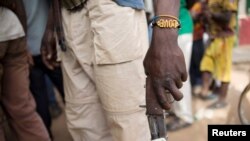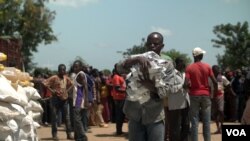The United Nations warns a new spiral of escalating violence in the Central African Republic is threatening to wipe out progress made since 2013 toward peace and reconciliation.
Renewed fighting between Christian anti-Balaka militia and the ex-Seleka Muslim rebels in mid-May continues to take a heavy toll. The United Nations reports more than 100,000 people have fled their homes, more than 100 have been killed and hundreds of others wounded.
The U.N.'s humanitarian coordinator for C.A.R., Najat Rochdi, says the peace dividend people were beginning to enjoy has all but disappeared. She warns worse lies ahead if the humanitarian and protection needs of the people continue to be forgotten by the International community.
“Today, they face the imminent risk that their communities, the entire country slides back into the abyss of conflict and violence, causing new suffering and jeopardizing all fragile gains and peace dividend,” she said.
Rochdi says the international community urgently needs to step up its support. She says money is desperately needed to provide humanitarian aid to millions of people in the C.A.R. living on a knife’s edge. She warns little time is left to stabilize the situation in the country.
“Otherwise, a last window of opportunity risks being shut very soon and the armed groups will fill the vacuum and gain more legitimacy, gain more power. But, then it means that we abandon the population and we abandon the communities to be the hostage of those armed groups,” she said.
Rochdi says half of the country’s population of 5 million depends on international aid for survival. She says two out of three people do not have access to safe drinking water, basic sanitation or health care. She says the C.A.R.’s children have some of the highest levels of chronic malnutrition in the world.
The U.N. official notes aid agencies are unable to provide the needed help because the United Nations has received only 25 percent of its $400 million humanitarian appeal.





